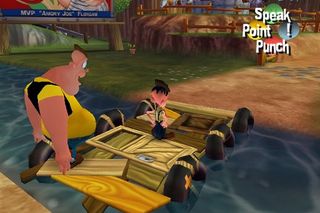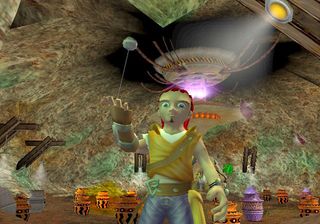The Top 7... Franchise failures
Take a look back at some of the industry's most fantastically disastrous non-starters
5. Floigan Bros. - Episode 1
2001 | Dreamcast
The game: Hoigle and Moigle Floigan, two brothers named after the sound of Jerry Lewis vomiting, need to find parts for an invention and save their Depression-era junkyard from a marauding, blue-skinned land baron who hurls cats out of zeppelins. Unlike some of the other false starts on this list, Floigan Bros. had some surprisingly forward-thinking features going for it, including downloadable content and a sidekick (Moigle) who could be trained like a virtual pet. Or as the press releases promised, would react to players "like a real, living, breathing cartoon character." Think about that for a second.

Above: You totally want to play this now, don't you?
The ambition: Originally pitched as a platformer that IGN called "Sega's answer to Banjo-Kazooie," Floigan Bros. was envisioned as a series of short, episodic adventures. "Ultimately, we want to make as many of these as we can," said Greg Thomas of developer Visual Concepts in a 2000 interview with IGN. "Each new Floigan Bros. game would have its own storyline [and] new things to do."
What killed it? Floigan Bros. was in development before the Dreamcast was released in 1999, but didn't hit shelves until months after Sega stopped producing the doomed system in 2001 - and it still had the stones to tack "Episode 1" onto its title. Interest that was high around the Dreamcast's launch - when the game got most of its hype - had long since fizzled. It also didn't help that the game hit amid a final torrent of weird, original and mostly forgotten Dreamcast releases, including Ooga Booga, Alien Front Online and Outtrigger. But even ignoring the game's console-related woes, it's difficult - even for die-hard Sega fans - to get excited about an adventure game starring a runty 1930s-cartoon throwback and his huge, idiot-savant brother. Add in the game's brief run time and an unenthusiastic reception from critics, and the Floigans were dead on arrival.
4. Haven: Call of the King
2002 | PS2
Sign up to the 12DOVE Newsletter
Weekly digests, tales from the communities you love, and more
The game: Haven, a weirdly proportioned teenage slave who uses a yo-yo as his main weapon, is tasked with freeing his planet from the grip of an evil overlord named Vetch. The game's greatest potential strength - and its greatest actual weakness - was its attempt to mash together as many genres as possible, starting out as a platformer and eventually moving on to more and more complex vehicles and play styles.

Above: Yeah, that's it, Haven. Glare at us while you work that yo-yo. Remind us why you sucked
The ambition: Almost boundless, according to a Gamasutra interview with Traveller's Tales co-founder Jon Burton, who described Haven: Call of the King as a passion project he'd wanted to make for years. Not only would the game give players limitless ways to explore its world (which in reality it didn't), but it was envisioned as a full-on Christian allegory - which is why, as Burton reveals, "the game ends with a cliff-hanger ending paralleling the Crucifixion."
What killed it? Unfortunately for its would-be messiah, general disinterest and crappy review scores scuttled any chance of a Haven sequel. While Burton blames the scores on editors who didn't play the game past the first hour, it's pretty clear fromreading reviews that a lot of them did - and were frustrated by the game's extremely linear nature, uneven pacing and insistence on forcing players to do everything (Platforming! Boats! Spaceships! Lengthy tail-gunner sequences!) while excelling at nothing.
The unsettling character designs made it a hard sell as well (seriously, red cornrows, a goatee and huge hands?), but what really killed Haven wasn't its anatomically challenged hero or its crummy critical reception. If anything, it's that the game had enough hubris to hit shelves during the crowded 2002 holiday season, going up against heavyweights like Ratchet & Clank, Kingdom Hearts and Grand Theft Auto: Vice City. With competition like that, a middling, overambitious allegory likeHaven never really had a chance. So long, overambitious allegory.

30 years later, Fallout creator Tim Cain is searching for a legendary D&D player who cheesed an entire competitive dungeon with a lightning-fast Monk build

As Dragon Age: The Veilguard director leaves and studio closure rumors surface, Mass Effect 5 director appears to hint the RPG is just fine: "Every week is a good week at work for me"
Most Popular
